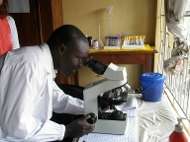TB Research in a Ugandan clinic. Credit: AMREF France / Flickr Creative Commons
It still takes a long time for TB and HIV patients in Uganda to be properly diagnosed. As a result, many patients are infectious without knowing it themselves. These diagnostic delays, and also adherence to therapy, can be explained by a combination of social and health care related factors, such as a lack of awareness about the diseases, the sex of a patient and socioeconomic status. This is one of the conclusions of the PhD research of Ibrahim Sendagire.
Sendagire has conducted research in three clinics in Kampala to evaluate the diagnosis and treatment of HIV and TB in urban areas in Uganda. He found that it often takes eight weeks or longer before a patient suffering from TB is properly diagnosed. In most cases, the diagnosis is made only after multiple visits to a clinic. Opportunities for diagnosis at an earlier stage are often missed. These findings correspond with previous research, leading Sendagire to conclude that it seems that diagnostic delays have not significantly improved over the course of time.
He also found that that TB-patients are often not tested for HIV, although between 30% and 50% of all TB-patients are also HIV infected. And if patients are diagnosed with HIV, it often takes a relatively long time before treatment is started, especially if the patients are women or unemployed people.
Another finding of the study is that around 20 percent of all TB patients stop their treatment, often when they move to another part of town. Determining factors in adherence to treatment for TB and HIV are income level and the quality and level of support of the treatment. Alcohol use is another factor in adherence to treatment.
In his thesis, Sendagire gives a large number of recommendations to improve TB and HIV control and treatment in urban parts of Uganda. One of these is that awareness about HIV and TB should be raised in urban communities and among health workers and drug shop and pharmacy attendants in particular. Sendagire also recommends that standard procedures are developed in which all TB suspects are offered HIV testing. Another recommendation is that clinic personnel should always enquire about plans of patients to move house, and, if patients are intending to move, to discuss options of continuing to treat their disease.
Sendagire's thesis is entitled "Operational aspects of diagnosing and treating tuberculosis and HIV infection in Ugandan urban areas." It is available for download here.


















